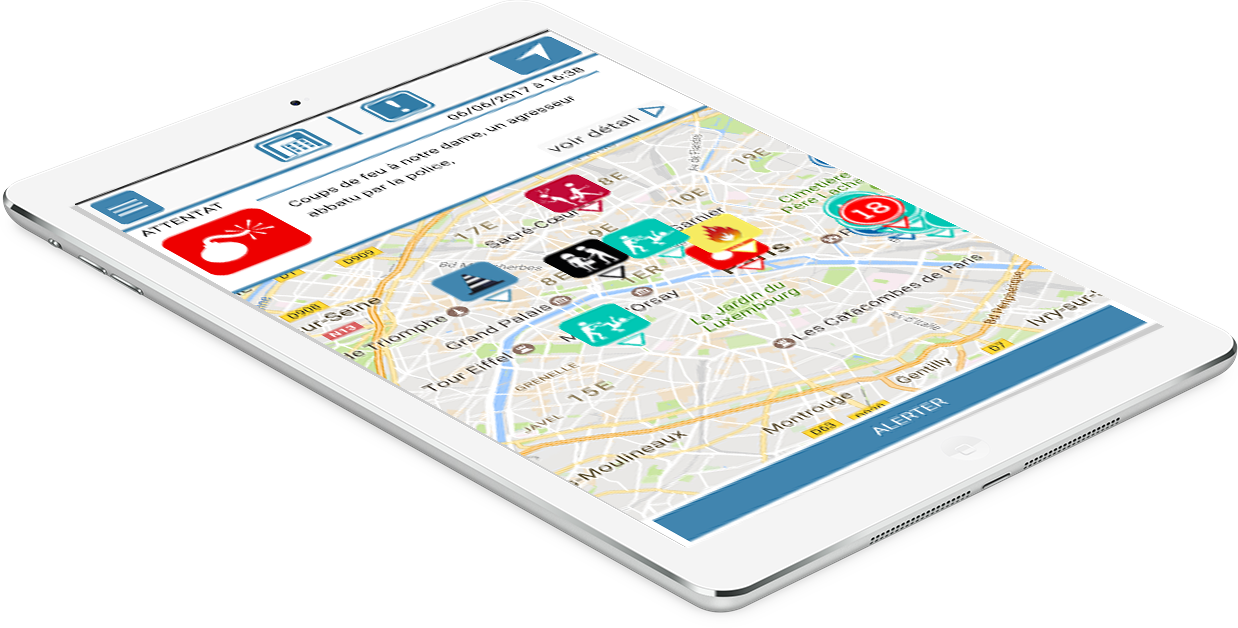In a general way, look for the most isolated possible shelter and put as soon as possible your mobile phone on « Silent » mode to avoid making you locate by the aggressors. Deactivate the cellular data of your smartphone: you will have no more access to Internet, but it will increases the quality of connection for the calls and SMS.
If you must alert rescue services, do not call 112 !
Send a SMS to 114
A voice call risks to block pointlessly the network and could allow the aggressors to locate you. 114 is the French Emergency National Department by SMS, for people having difficulty hearing or speaking.
If your attacker is armed, raise your hands and speak calmly. Explain each movement you make so as to meet his/her request. Avoid making any sudden movement. Do not shout. In the event of an attack, stress is contagious. Your attacker is also in an unusual situation and you must not try to second guess his/her reactions. By shouting, the attacker may lose control and this could give him/her an additional reason to attack you physically. An attacker may also be under the influence of drugs or alcohol which may make his/her reactions more unpredictable.
The risk may also originate from an armed terrorist attack, or organised crime, or even less well organised criminals against an institutional building or shop, or even from the exchange of fire between the police and criminals. In the vast majority of cases, you will not be the intended victim of the attackers, but the risk of being injured by a stray bullet should not be forgotten.
Prevention
A shoot-out is generally not something that can be expected as it is, more often than not, the result of an unexpected situation. Generally speaking, and in order to reduce the risk of being involved in a shoot-out, avoid the edges of gatherings of crowds of people and protests. In some countries, social unrest is strong, and you should avoid parking around the edge of institutional buildings which represent the power in place. In some cities with high crime rates, seek information about areas to avoid as there may be instances of settling of scores between rival groups or exchanges of fire between the police and criminals. Also pay close attention to celebratory fire or the demonstration of force.
How to react
If you are caught in the middle of a shoot-out, you will be in a confused state which can disturb and hinder your interpretation of events and senses. Try, as far as possible, to remain calm and not allow yourself to be taken over by stress which can make you freeze and reduce your chances of escape.
Generally, try to find shelter, as isolated as possible, with concrete protection. Do not forget that the fact you cannot be seen does not necessarily protect you from bullets (a brick wall will offer protection; hedges or barriers will only conceal you).
In order to protect yourself, try to work out the direction from which shots are coming. It is often very difficult to do this by ear. Look around for the impact of bullets so as to determine the position of those who are shooting.
If you are in a large public area where it is hard to hide, such as an airport lobby or station, we recommend the following:
– Crouch down and try to find shelter, where possible, as isolated as possible and as close to you as you can.
– Move around in a “zig zag” formation so as to reduce the chances of being targeted.
– Call an emergency number as soon as possible (112).
If you are indoors where there is no shelter, it may be best to lie down, remembering that:
– If targets are to be selected, it is more likely that those who are stood up be selected as they are easier to hit.
– Inversely, if the shooter(s) appear to be randomly choosing targets, the shots will more often be “downwards”. Try to seek shelter but avoid lying on the ground.
– If you are in a street, a vehicle can be an obstacle behind which you can take shelter. Where possible, position yourself behind the engine or against the ground behind the wheels which act as good shields.
If, when shooting occurs, you are in a building and these shots come from within, it is best to seek to escape as follows:
– Where possible, leave the site and leave all belongings behind, aside for your phone, so as not to waste time. Your life is more precious than objects.
– Leave the building regardless of what those around you are saying.
– If possible, help others to leave the building (but do not let them slow you down).
– Try to leave the perimeter or field of vision of the shooter(s).
– Try to prevent other people from entering the building.
– Call an emergency number as soon as possible.
If you are in a confined place without any exit:
– Seek refuge in a closed room. Try to go into a room which lock from the inside.
– Switch off the lights in the room and close the blinds so as to be discrete and reduce the visibility of the shooter.
– Put your mobile phone onto silent mode.
– Block the door with large objects (a table for instance) so as to reduce the margin for manoeuvre of the shooter and gain time.
– Hide behind large objects which can be used as a shelter.
– Remain as silent as possible so as not to awaken the attention of your attackers.
– Try to call an emergency number.
If the shooters access the building where you are located and it is impossible to exit as they have blocked all exit routes, there is no good or bad solution. Depending on your experience and capacities, it is possible to:
– If you choose to attack, go directly towards the shooter so as to try and overcome him/her. This will then disarm him/her and mean there is less chance of being struck by projectiles. With less distance between you and an armed person, you will have more chances of neutralising him/her.
– Use any object which may be useful as protection or a weapon such a furniture, an extinguisher, etc.
– If you choose defence, remain calm and follow the instructions of your attacker, keep your hands visible to reassure the shooter, and avoid screaming or pointing at him/her. If you are in a vehicle, do not get out, aside for in any exceptional circumstances. If it is possible, accelerate and move out of the area where the shooting is taking place. To hide, try to get behind the engine which is the most solid structure on a car and will be the best shield. If there is a better shelter nearby, crawl along the side of the road to this shelter.
Police intervention
Where the shooters are still alive and have not been controlled, the first people to intervene on site during a shooting are not the emergency services (fire, doctors, emergency first aid) but the police. During the assault, and initially, they are not there to care for the injured or look for victims, but to neutralise the attackers. In order to avoid injury during this operation, it is recommended as follows:
– To remain on the ground
– Not to move
– Do not call anyone and remain as discrete as possible
If your attackers use grenades, try to:
– Find a solid shelter close by
– Lie down. Grenade shrapnel tends to rise about one metre high and over a radius of ten metres.
After an attack:
If you can, do not remain on the site of the attack. Find a public place to take refuge.
– Call the police: dial 112 or visit the closest police station.
– Inform your local contact person in the country. This person can help you to appreciate the situation and allow you to try and move on from the incident. If you do not have any local contact person, you should notify your hotel.
– Notify your embassy, who will be able to offer you useful recommendations in line with the country where you are. If your administrative documents have been stolen, they can assist in having these re-issued.
– It is recommended to follow medical treatment in order to attenuate the symptoms of post-traumatic stress.



